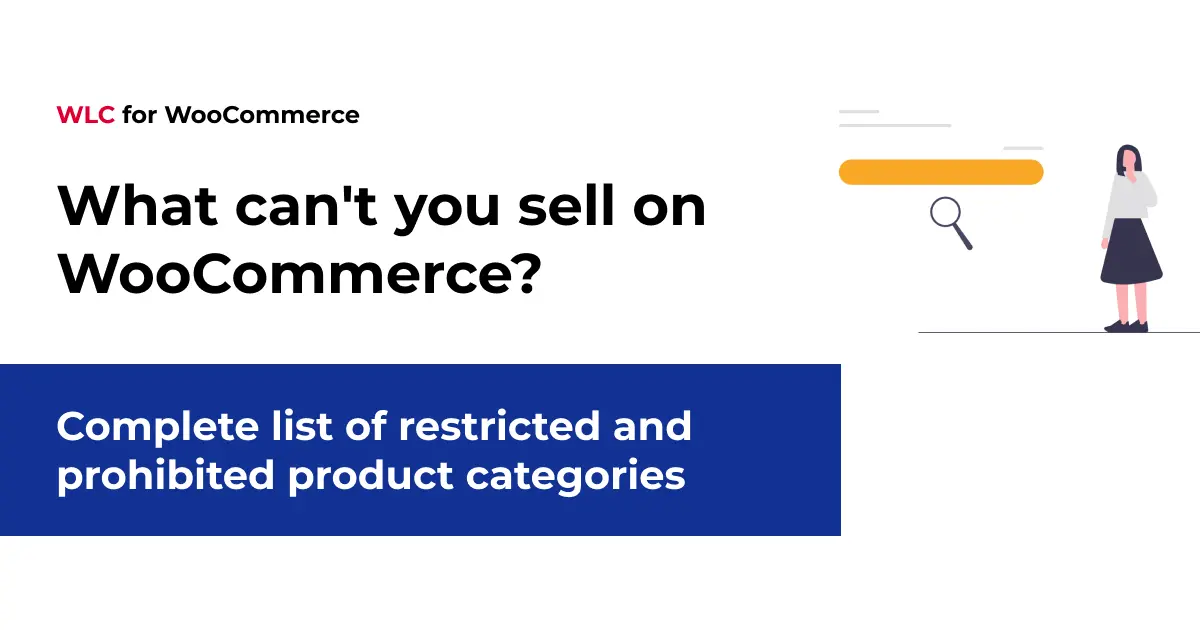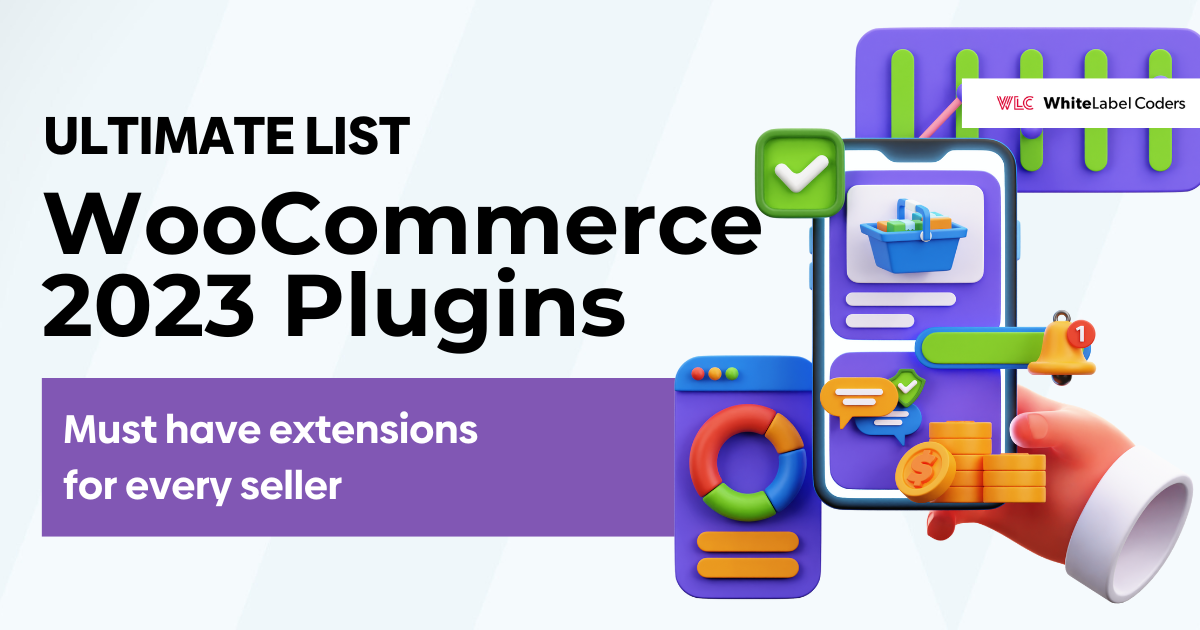Category: WooCommerce
What can’t you sell on WooCommerce?

What can’t you sell on WooCommerce? Complete list of restricted and prohibited WooCommerce product categories
WooCommerce itself is an incredibly flexible platform that powers approximately 28% of all online stores, enabling merchants to sell virtually any legal product. However, several categories face significant restrictions or outright prohibition. Illegal products naturally top this list, including narcotics, counterfeit goods, and stolen merchandise. Controlled substances such as prescription medications, certain chemicals, and unauthorized pharmaceuticals are prohibited as well.
Weapons and weapon-related items face substantial restrictions, including firearms, ammunition, and certain tactical gear. Adult content and services typically encounter both platform and payment processor restrictions. Additionally, items violating intellectual property rights—such as unauthorized replicas of branded merchandise—are not permitted.
Products requiring special licensing or regulatory approval often face heightened scrutiny, and items that violate WordPress.com hosting policies might be restricted when using their hosting services. It’s important to note that even when WooCommerce as a platform doesn’t explicitly prohibit certain items, payment processor restrictions often become the limiting factor for controversial products.
Why does WooCommerce restrict certain products?
The restrictions on specific product categories stem from a complex web of legal, ethical, and business considerations. As an open-source platform, WooCommerce must operate within legal frameworks across multiple jurisdictions worldwide. This means complying with international laws governing commerce, particularly those related to controlled substances, weapons, and age-restricted products.
Payment processor requirements represent perhaps the most significant constraint. Major payment gateways like Stripe and PayPal—which WooCommerce integrates with seamlessly—maintain strict policies about what can be sold through their services. These processors face regulatory pressure and financial risk when facilitating transactions for certain product categories.
Liability concerns also drive restrictions. Both WooCommerce and WordPress aim to minimize legal exposure that could come from facilitating potentially harmful transactions. Additionally, ethical considerations and brand reputation play important roles in determining what products align with platform values.
While WooCommerce offers “thousands of features other e-commerce platforms simply do not offer” as an open-source platform, this flexibility comes with responsibility. Store owners must navigate these restrictions while leveraging WooCommerce’s extensive customization capabilities.
What are the consequences of selling prohibited items on WooCommerce?
Merchants who attempt to sell restricted products on WooCommerce face a cascade of potential consequences. Account suspension is typically the first and most immediate response. WordPress.com or your hosting provider may terminate your site without warning if prohibited items are detected, resulting in business disruption and potential loss of customer data.
Payment processing issues often emerge even before formal penalties. Payment gateways may freeze funds, terminate merchant accounts, or place funds on extended holds when they identify transactions involving prohibited items. These actions can create serious cash flow problems for businesses.
Legal consequences represent the most severe potential outcome. Depending on the products involved, merchants could face regulatory investigations, civil penalties, or even criminal charges in certain jurisdictions. The severity escalates significantly for items like controlled substances or counterfeit goods.
Reputation damage extends beyond the immediate business impact. A suspended store or legal entanglement creates lasting harm to your brand reputation, potentially affecting future business ventures even after resolving the immediate issues.
With WooCommerce powering a significant percentage of online stores globally, the platform and its payment partners maintain sophisticated monitoring systems to identify policy violations, making detection increasingly likely over time.
How do WooCommerce restrictions compare to other e-commerce platforms?
When comparing product restrictions across major e-commerce platforms, WooCommerce generally offers more flexibility than many alternatives, though core prohibitions remain consistent. Shopify maintains similar restrictions regarding illegal goods, weapons, and adult content, but its hosted nature means more direct enforcement of policies compared to self-hosted WooCommerce installations.
BigCommerce parallels many WooCommerce restrictions, particularly regarding high-risk items, though its integration with WordPress (as mentioned in the context) creates an interesting dynamic for merchants seeking both platforms’ advantages. Etsy, focusing on handmade and vintage items, applies additional restrictions based on its marketplace principles, especially around mass-produced products.
The key differentiator for WooCommerce is its self-hosted nature. When running your own WooCommerce installation (rather than using WordPress.com hosting), you maintain more control over product decisions, with payment processor policies becoming the primary limitation rather than platform rules.
While all major platforms prohibit clearly illegal items, WooCommerce’s open-source foundation and extensive customization options provide more flexibility for gray-area products that might require special handling or alternative payment solutions—though this flexibility comes with greater merchant responsibility.
Can you sell CBD products on WooCommerce?
The sale of CBD products through WooCommerce exists in a complex regulatory and policy landscape. WooCommerce as a platform doesn’t explicitly prohibit CBD products, making it technically possible to list and sell them. However, significant challenges emerge with payment processing, as mainstream providers like PayPal and Stripe typically prohibit CBD transactions under their terms of service.
Legal considerations vary dramatically by jurisdiction. In some regions, CBD products derived from hemp with minimal THC content may be legal, while others maintain strict prohibitions or require special licensing. This patchwork of regulations creates compliance challenges for merchants operating across multiple markets.
For store owners determined to sell CBD products on WooCommerce, several approaches exist. Specialized high-risk payment processors that explicitly accept CBD transactions offer one solution, though typically with higher fees. Some merchants implement alternative payment methods like bank transfers or cryptocurrency payments to circumvent traditional processor restrictions.
The most sustainable approach combines careful legal research with transparent business practices. This includes clear product labeling, comprehensive lab testing, age verification systems, and explicit policies regarding shipping limitations. Given the evolving nature of CBD regulations, staying informed about legal changes is essential for long-term success in this category.
Are digital products restricted on WooCommerce?
Digital products generally face fewer restrictions on WooCommerce compared to physical goods, but important limitations still apply. Copyright concerns represent the most significant restriction category. Selling digital content without proper rights—whether music, videos, e-books, or software—violates both platform policies and legal protections.
Adult-oriented digital content faces similar restrictions to physical counterparts. Most payment processors prohibit adult material regardless of format, creating payment challenges even when the platform itself doesn’t explicitly ban such content on self-hosted installations.
Gambling-related downloads and content that facilitates gambling activities typically encounter restrictions from both WooCommerce and payment processors, with regulatory frameworks varying significantly by location. Potentially harmful digital goods like certain types of software (hacking tools, surveillance applications) may also face restrictions.
WooCommerce actually excels at selling compliant digital products, offering built-in functionality for digital downloads, license keys, and subscription management. As mentioned in the context, WooCommerce “allows you to sell both digital and physical products” with extensive flexibility, making it particularly well-suited for content creators, software developers, and digital service providers who work within platform guidelines.
What payment processors work with restricted products on WooCommerce?
For merchants selling products in gray areas or higher-risk categories, alternative payment processors offer potential solutions when mainstream options decline transactions. High-risk merchant accounts represent the most established option for legally permissible but restricted products. These specialized payment processors explicitly work with industries facing traditional banking challenges, though typically charging higher fees and requiring more extensive documentation.
Cryptocurrency payment gateways have emerged as an increasingly viable alternative for WooCommerce stores selling controversial products. These solutions allow merchants to accept Bitcoin and other cryptocurrencies, bypassing traditional banking restrictions. Several WooCommerce-compatible plugins facilitate these transactions, though market volatility and consumer adoption remain challenges.
Direct bank transfer options, while more cumbersome for customers, provide another alternative for products rejected by mainstream processors. WooCommerce includes built-in functionality for bank transfers, making implementation straightforward.
The context notes that “core WooCommerce plugin supports majority of popular credit cards, bank transfers, PayPal and even COD. It provides over 100 payment interfaces including Stripe, Amazon Payments and others.” However, each of these processors maintains its own restricted product policies, which merchants must navigate carefully when selling controversial items.
How can you determine if your product is allowed on WooCommerce?
Determining whether your specific products comply with WooCommerce and payment processor policies requires a systematic research approach. Begin by thoroughly reviewing the WooCommerce terms of service and acceptable use policies, noting that these may differ between self-hosted installations and WordPress.com hosting.
Next, carefully examine the terms of service for your intended payment processors. Since payment restrictions often prove more limiting than platform policies, understanding processor guidelines for Stripe, PayPal, or alternatives is essential. Look specifically for prohibited product lists and high-risk merchant categories.
For products in potentially restricted categories, consult with a legal professional familiar with e-commerce regulations. This step becomes particularly important for products like CBD, supplements, or age-restricted items where regulatory frameworks may be complex or changing.
When uncertainty persists, direct outreach to payment processors can provide clarity. Many offer merchant support channels to address specific product questions before account setup. Taking these proactive steps helps avoid the significant business disruption that comes from having products removed or accounts suspended after launch.
What are the best alternatives for selling restricted products online?
When WooCommerce isn’t viable for your product category, several alternative platforms and approaches exist for selling restricted items legally. Specialized e-commerce platforms catering to specific industries often maintain relationships with payment processors familiar with those sectors’ unique requirements. Examples include platforms specifically designed for adult products, vape/tobacco items, or firearms accessories (where legally permitted).
Marketplace approaches can sometimes offer solutions when direct-to-consumer sales face restrictions. Established marketplaces may have pre-existing agreements with payment processors that allow certain categories individual merchants cannot access. However, marketplace policies vary widely, and many enforce similar or stricter restrictions than WooCommerce.
Building a custom e-commerce solution represents another option for merchants with sufficient resources. Custom platforms can be designed to integrate with specialized payment processors or alternative payment methods from the ground up, though development costs and complexity increase significantly.
For truly challenging products, hybrid models combining online presence with alternative transaction methods sometimes provide solutions. This might include online showcasing with in-person transactions or phone order completion—approaches that require careful legal consideration but occasionally offer viable paths forward.
Essential WooCommerce compliance insights to remember
Successfully navigating WooCommerce’s product restrictions requires understanding several fundamental principles. First, recognize that payment processor policies often create more significant limitations than the platform itself. Even when WooCommerce technically allows certain products, inability to process payments makes selling them impractical.
Compliance is not a one-time consideration but an ongoing responsibility. Regulations and platform policies evolve, requiring merchants to stay informed about changes affecting their product categories. Maintaining documentation of compliance efforts creates an important audit trail should questions arise.
When working in gray areas, transparency becomes essential. Clear product descriptions, explicit terms of service, and appropriate age verification or disclaimers demonstrate good-faith efforts to operate responsibly. This transparency serves both compliance objectives and customer relationships.
Finally, the most successful WooCommerce merchants build sustainability through compliance rather than seeking workarounds. As the context notes, WooCommerce offers exceptional flexibility, powering “28% of all online stores” and enabling merchants to “sell everything from digital downloads and physical products to services and even subscriptions anywhere in the world.” Working within platform guidelines allows merchants to fully leverage this powerful ecosystem for long-term business success.
For merchants seeking to maximize their WooCommerce potential while navigating product restrictions, partnering with experienced developers familiar with platform limitations can make a significant difference. Professional guidance can help identify compliant approaches to challenging product categories or suggest viable alternatives when necessary. Learn more about WooCommerce development to understand how expert implementation can help your store succeed while maintaining compliance.
Understanding what are the limitations of WooCommerce is essential for any business planning to launch an online store. For merchants concerned about platform performance with large inventories, it’s worth exploring whether WooCommerce can handle high traffic before making significant investments. Additionally, those comparing platforms should review whether WooCommerce is better than Shopify for their specific business model and product offerings.
WooCommerce Product Compliance Checklist
Use this comprehensive checklist to verify compliance before launching products on WooCommerce and maintain ongoing adherence to platform policies:
Initial Product Assessment
- Legal Status Verification: Confirm your products are legal in all jurisdictions where you plan to sell. Research federal, state, and local regulations that may apply.
- Product Category Classification: Identify whether your products fall into high-risk categories (CBD, adult content, weapons, supplements, etc.) that typically face additional restrictions.
- Licensing Requirements: Determine if your products require special licenses, certifications, or regulatory approvals in your target markets.
- Age Restrictions: Assess whether your products require age verification or have minimum purchase age requirements.
Platform Policy Verification
- WooCommerce Terms Review: Read the current WooCommerce terms of service and acceptable use policies, noting differences between self-hosted and WordPress.com hosting.
- Hosting Provider Policies: If using third-party hosting, review your hosting provider’s acceptable use policies for additional restrictions.
- WordPress.com Restrictions: For WordPress.com hosted sites, verify compliance with their specific commerce policies and content guidelines.
- Plugin Compatibility: Ensure any WooCommerce extensions you plan to use support your product categories and comply with their own terms.
Payment Processor Compatibility Checks
- Primary Processor Review: Thoroughly examine terms of service for your preferred payment processor (Stripe, PayPal, etc.) and their prohibited product lists.
- Alternative Processor Research: Identify backup payment processors that accept your product category, including high-risk merchant account providers if necessary.
- Transaction Fee Analysis: Compare processing fees across different providers, as restricted products often incur higher costs.
- Account Application: Complete merchant account applications honestly, disclosing your product categories upfront to avoid future account termination.
Ongoing Compliance Monitoring
- Policy Update Tracking: Subscribe to notifications from WooCommerce, your hosting provider, and payment processors regarding policy changes.
- Regulatory Monitoring: Stay informed about changing regulations in your industry and target markets through trade associations or legal counsel.
- Quarterly Compliance Review: Conduct regular assessments of your product listings against current policies and regulations.
- Documentation Maintenance: Keep records of compliance efforts, legal consultations, and policy adherence for potential audits or disputes.
- Customer Communication: Maintain clear terms of service, privacy policies, and product disclaimers that reflect current compliance requirements.
Pro Tip: Before launching any potentially restricted products, consider conducting a small test with a limited product range to verify payment processing and policy compliance before scaling your inventory.
Need a WooCommerce store? Contact us and let’s explore the possibilities together.






